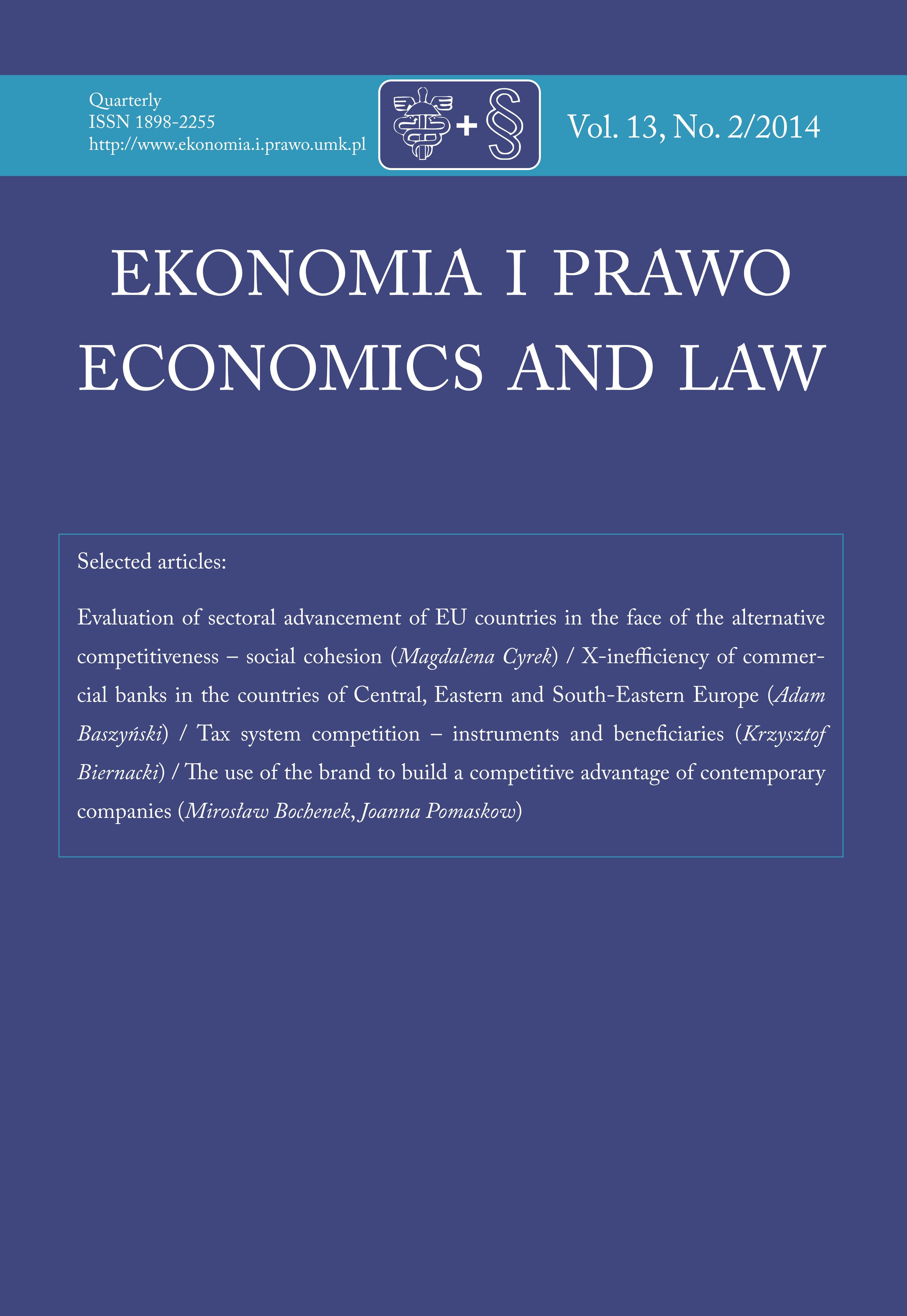EVALUATION OF SECTORAL ADVANCEMENT OF EU COUNTRIES IN THE FACE OF THE ALTERNATIVE COMPETITIVENESS – SOCIAL COHESION
DOI:
https://doi.org/10.12775/EiP.2014.022Keywords
structural advancement, aims of developmental policyAbstract
The study deals with a problem of inner consistency of aims of EU socio-economic policy, that often takes a form of the alternative: competitiveness – social cohesion. Criteria of political choice, which are not always revealed can lead to formulation of different recommendations and implementation of different solutions also concerning a field of sectoral policy.
In the background of the decisive problems, in the text were presented some alternative evaluations of sectoral development of EU-28 countries, which were prepared taking the assumptions of two variants of priorities found in the effectiveness aims or the social aims. There were presented two alternative rankings of countries which were worked out basing on Eurostat statistical data describing 2011 year. To reflect a sectoral advancement in a synthetic way in both cases there was used a method of development model basing on the Euclidian distance. In the first variant the choice of variables was dictated by their significant correlation with GDP per capita, in the second one with Gini coefficient. As a result there was verified a thesis about consistency of models of structural changes from the point of view of realizing aims of competitiveness and cohesion.
Results of the analyses indicate that better effects for integrated development can be found within the variant where the attention is focused on social aims. Such model of development is successfully realized by Scandinavian countries. An irrefutable role in modernization processes that favour reconciliation of competitiveness and social cohesion is played by knowledge-intensive sectors, especially of service character.
References
Antonelli C., Fassio C., The economics of the light economy. Globalization, skill biased technological change and slow growth, „Technological Forecasting and Social Change” Vol. 87/2014, http://dx.doi.org/10.1016/j.techfore.2013.11.006.
Cyrek M., Sektorowe charakterystyki państw UE wobec alternatywy konkurencyjność – spójność społeczna, [in:] M.G. Woźniak (ed.), Nierówności społeczne a wzrost gospodarczy. Gospodarka Polski 1990-2013. Nadzieje i obawy o perspektywy zintegrowanego rozwoju, No. 37(1/2014), Wydawnictwo Uniwersytetu Rzeszowskiego, Rzeszów 2014.
Eurostat, http://epp.eurostat.ec.europa.eu (20.08.2013).
Gerapetritis G., Europe’s new deal: a new version of an expiring deal, „European Jour-nal of Law and Economics”, Vol. 38/2014, http://dx.doi.org/10.1007/s10657-013-9422-z.
Iordana M., Chilian M.N., The sectoral structures in Romania, its regions and the EU countries – key features of economic and social cohesion, „Procedia Economics and Finance” Vol. 8/2014, http://dx.doi.org/10.1016/S2212-5671(14)00106-3.
Jabłoński Ł., O nowym programie badawczym nad nierównościami społeczno-ekonomicznymi, [in:] M.G. Woźniak (ed.), Nierówności społeczne a wzrost gospo-darczy. Kryzys finansów publicznych – przyczyny, implikacje, perspektywy spójno-ści społeczno-ekonomicznej, No. 31, Wydawnictwo Uniwersytetu Rzeszowskiego, Rzeszów 2013.
Koźlak A., Możliwości poprawy spójności terytorialnej UE w kontekście rozwoju sys-temów transportowych, [in:] M. Klamut, E. Szostak (eds), Jaka polityka spójności po roku 2013?, Prace Naukowe Uniwersytetu Ekonomicznego we Wrocławiu No. 95, Wydawnictwo Uniwersytetu Ekonomicznego we Wrocławiu, Wrocław 2010.
Leszczyńska M., Zróżnicowanie dochodów ludności rolniczej i ich uwarunkowania, Wydawnictwo Uniwersytetu Rzeszowskiego, Rzeszów 2007.
Pan L., The impacts of education investment on skilled–unskilled wage inequality and economic development in developing countries, „Economic Modelling” Vol. 39/2014, http://dx.doi.org/10.1016/j.econmod.2014.02.040.
Piech K., Wiedza i innowacje w rozwoju gospodarczym: w kierunku pomiaru i współ-czesnej roli państwa, Instytut Wiedzy i Innowacji, Warszawa 2009.
Ślusarczyk B.L., Determinanty międzynarodowej pozycji konkurencyjnej gospodarki polskiej w okresie transformacji, Wydawnictwo Uniwersytetu Rzeszowskiego, Rzeszów 2009.
Woźniak M.G., Teoretyczne i praktyczne kwestie budowy spójności społeczno-ekonomicznej dla gospodarki innowacyjnej, [in:] M.G. Woźniak (ed.), Gospodarka Polski 1990-2011. Tom 3. Droga do spójności społeczno-ekonomicznej, Wydawnictwo Naukowe PWN, Warszawa 2012.
Downloads
Published
How to Cite
Issue
Section
Stats
Number of views and downloads: 434
Number of citations: 0
